5. Pan’s Labyrinth (2006)
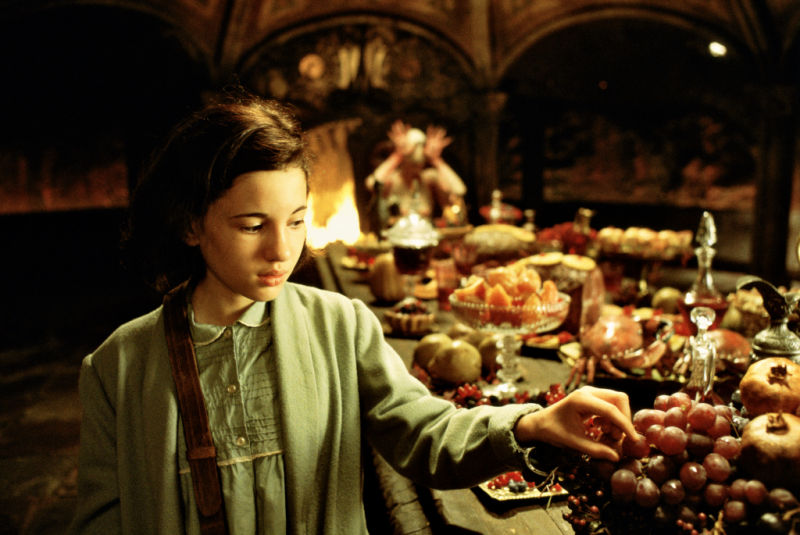
Another film of the Spanish revolution that took place in 2006. Guillermo del Toro’s “Pan’s Labyrinth” brings us back to the original concepts of what fantasy is meant to be, escapism from our reality, and re-imagines it in a dark twisted world that not many people would be willing to go.
Del Toro has spent much of life dealing with schizophrenia, it’s only natural to assume this was both a curse and a gift for him to bear, with this mindset he’s been able to envision worlds and creatures none of us could even begin to imagine.
This is what shines through in “Pan’s Labyrinth”, he takes our classic fantasy creatures like fairies and fauns and gives them a make over that’s sure to haunt upon first viewing but strangely enchants. Guillermo del Toro recognizes the underlying horror that’s buried beneath our classic fairy tales and brings it to the forefront.
This fantasy world is caught in the middle of WWII Spain in 1944, young Ofelia is brought into a new home with her pregnant mother now that she’s married to a Captain Vidal, a fascist under the facade of a military man. There’s a waitress for Vidal named Mercedes who Ofelia discovers is working for the rebels hiding out in the forests, Ofelia doesn’t rat her out though because she doesn’t want to be one to cause harm towards others.
The brilliance of the film is in how it takes two completely different worlds, that of fantasy and that of war, and shows the correlation between the two. The dangers in both worlds are always felt and will severely compromise the other. Fantasy isn’t merely a vehicle of escaping but one for us to bring back to reality, no matter how grim it may be.
4. Oldboy (2003)
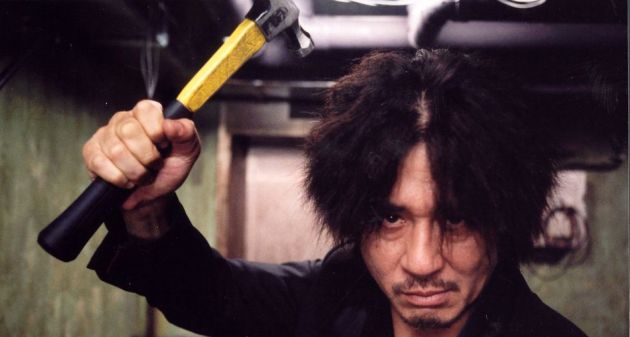
Park Chan-Wook has risen to international super stardom with his now famous vengeance trilogy consisting of “Sympathy for Mr. Vengeance”, “Lady Vengeance”, and the middle film “Oldboy”.
“Oldboy” is far and away the best of this trilogy, and possibly the most disturbing, telling the story of Oh as he’s finally freed after 15 years of imprisonment. Upon escaping he must now seek his captors who’ve taken his entire life away from him. Oh is consumed with vengeance, in one key scene he’s at a restaurant and asks for his food to be living, not because he enjoys eating live food more but because he needs to consume life after having none of it for so long.
The film is filled with hard hitting brutality at its finest, serving as an expression of the pain and suffering Oh has gone through. All these years have completely changed him, whether for better or worse is anyone’s guess.
Korean cinema has opened up the doors for artistic possibility that’s almost never seen here in America, content doesn’t make a film great, it’s how the content is used that makes it great and “Oldboy” is one of the finest examples of pure violence depicted. Park Chan-Wook has had a fascinating career ever since and he can owe a lot of that to this film.
3. No Country for Old Men (2007)
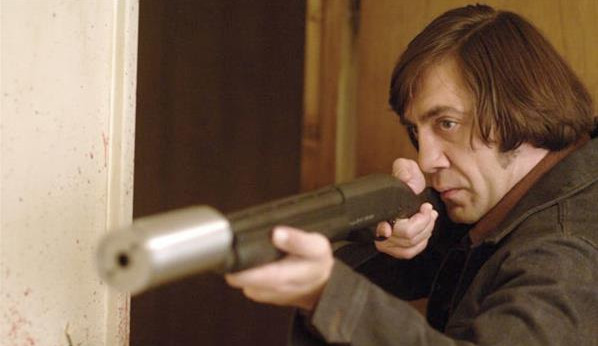
In the beginning of “No Country For Old Men”, we hear the gravely voice of Ed as he describes a teenage murderer that was sent to death, “he told me there wasn’t anything passionate about it and that he’d been thinking of killing someone for as long as he could remember”.
It may have been a story for someone else but it almost serves as the introduction to our cold-hearted villain Anton. Anton is a merciless killer, where most people would do horrible acts because they want to, Anton feels he has no choice but to do the unspeakable.
He doesn’t seem to enjoy what he’s doing, never knows if he’s doing the right thing or the wrong thing but above all could care less. Anton is chasing after Llewelyn, a poor Texan who comes across the remains of a drug trade gone horribly wrong where everyone died and comes into the possession of $2 million.
But there’s something much more sinister that lurks in “No Country For Old Men”, it takes on the essence of a crime thriller but really acts as more of an examination. Fate is a scary thing, the idea of your destiny being predetermined is a hard curse to bear.
What if your fate was to be someone or something you don’t even condone? In one miraculous scene, Anton enters a gas station and plays games with the old cashier, Anton lets chance and luck be the deciding factor and flips a coin, chance and luck are something that Anton is going to become familiar with later on.
Films like “No Country For Old Men” are very once in a while in that the perfection is rare to come by. The Coens raise the craft of filmmaking to another level here and everything punctuates their technique.
We really get a glimpse into the evolution of the dark criminal mind and how it’s evolved to a point where not only can we not control it, but even worse, we can’t even understand it. The world has changed as well as the people in it, nothing is the way it used to be which is why this is No Country For Old Men.
2. There Will Be Blood (2007)
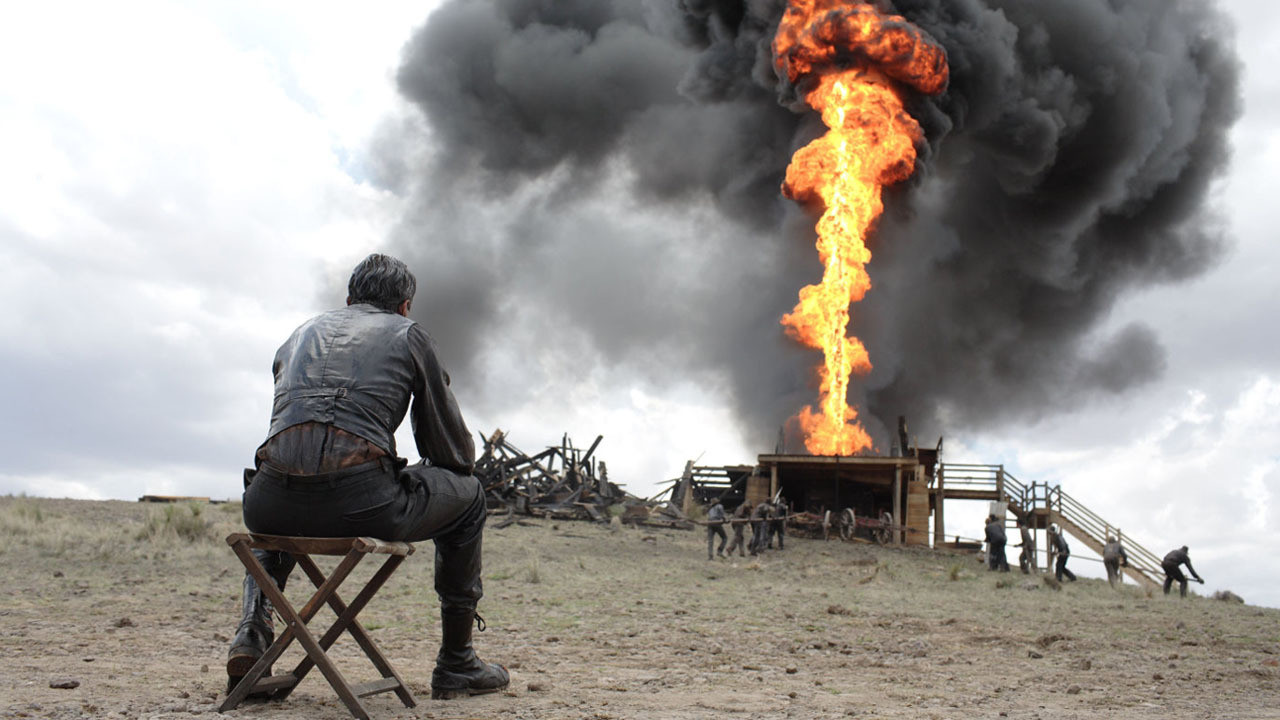
The film opens up, we see a desolate land of dirt and rocks and a miner down in the earth mining for silver and gold. He falls and breaks his leg and resorts to dragging his broken body across this harsh terrain in the middle of nowhere.
This man is Daniel Plainview and these opening 15 minutes of “There Will Be Blood” serve as the perfect introduction to who this man is, he’s a prospector in the early part of the 20th century driven by greed and cares more for his wealth than anything else.
After earning his wealth with mining, he becomes an oil tycoon and buys up whatever land he can get his hands on from lower, underachieving people to fuel himself. Part of his manipulation game is that he travels around with his son and business partner HW.
Daniel took HW into his family after his father died at the hands of one of Daniel’s constructions, he didn’t adopt him because he felt an obligation but because he knew with a kid by his side he could pass for a good man. Daniel travels out to California to buy this new land and expand his oil empire. He comes into meeting the Sundays, more specifically Eli who serves as the preacher of their town, and comes into conflict with them.
Daniel loses more and more of his humanity in the process, in the beginning moments, it actually appears that Daniel could turn his morality around. He seems to have a loving relationship with his son and what he ultimately does bring to others is good, once the relationship with Daniel and HW is compromised all his good deeds go away as he abandons his child and continues with his business.
There are many great things to discuss when watching “There Will Be Blood”, many of which I can’t possible condense right now, but this film showed that films of the current age can still be on par if not better than our classics of the past.
Much of this is because of the material by Upton Sinclair, much of this is because of the masterful direction by Paul Thomas Anderson, and much of this is because of the legendary performance by Daniel Day-Lewis. Many film societies have declared this as the greatest film of the 21st century and it’s not hard to see why.
1. Mulholland Drive (2001)
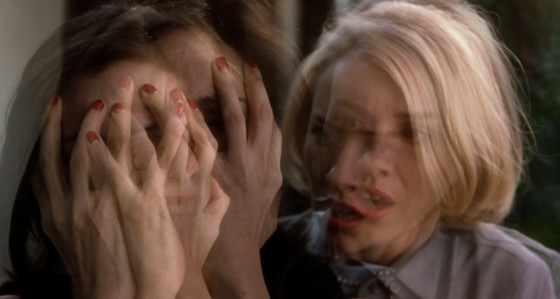
Throughout his career, David Lynch has done nothing more than navigate us through the human mind and expose the underlying darkness contained in it. “Mulholland Drive” was a concept that originally had its roots in television but never got off the ground, but Lynch decided to take what he had filmed for a pilot and turn it into a film.
Many have claimed this as the reason why the film has a disjointed feel in structure, but I think there’s something more to it than that. If you know Lynch you’ll know nothing is left simply to coincidence.
From the beginning where we see a bunch of people in a jitterbug dance competition with Betty having the lights shine bright on her the film takes on a dream like feel, nothing ever really connects but then again when do dreams ever seem logical? As Lynch navigates us through the hills of Hollywood, the dreams of success, and the nightmares of failure he paints a picture all too familiar to those who observe it.
Time and time again aspiring young talent move to the “land of opportunity” with their head in the clouds as they hold on to that hope of making it only to realize the reality that there not beautiful enough or they don’t have the right connections to higher ups.
Lynch demonizes those who oppose deserving talent and portrays them with the haunting imagery they deserve to be associated with. The well-being of these people can be jeopardized but the show will always go on because they’re nothing more than spokes on the wheel, a poor woman can faint on stage but the music will keep right on playing.
It always amazes me that there are people like David Lynch in this world, minds who see and feel reality in such different ways, and thank god we have them because there would be something missing if they weren’t around.